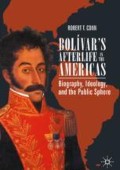Abstract
If Bolívar has been pulled in different directions, his figure each time partially erased as his interpreters go though and around him to produce their particular iteration, we need a usable narrative against which to begin to make sense of how he has been deployed in critical discourse. The choice of beginnings and endings for constructing such a narrative is not an innocent one, but in the interest of providing an account of the most important spaces to which his interpreters go, always elaborating them anew, let us start with his family origins, racial descent, and early life, not because that is where we ourselves are starting or others have always, but rather because it is a space of representation just as all other elements of his life are, his biography worked and reworked on the national and hemispheric stages.
Access this chapter
Tax calculation will be finalised at checkout
Purchases are for personal use only
Notes
- 1.
John Lynch, The Spanish American Revolutions, 1808–1826 (N.Y.: W. W. Norton and Co., 1973), 201.
- 2.
Ibid., 22 and 231.
- 3.
John Lynch, Simón Bolívar: A Life (New Haven: Yale University Press, 2006), 22.
- 4.
Ibid., 2.
- 5.
Ibid., 23.
- 6.
Ibid., 24.
- 7.
Ibid., 23.
- 8.
Felipe Larrazábal, 1865, La vida y correspondencia general del libertador Simón Boliva; enriquecida con la inserción de los manifiestos, mensages, exposiciones, proclamas, &. &. (New York: E.O. Jenkins, 1865), 490.
- 9.
Aline Helg, Liberty and Equality in Caribbean Colombia, 1770–1835 (Chapel Hill: The University of North Carolina Press, 2004), 165–166.
- 10.
Jaime E. Rodríguez O., The Independence of Spanish America (Cambridge, UK: Cambridge University Press, 1998), 188.
- 11.
Jeremy Adelman, Sovereignty and Revolution in the Iberian Atlantic (Princeton: Princeton University Press, 2006), 396.
- 12.
Ibid., 303–304.
- 13.
William Spence Robertson, “The Recognition of the Hispanic American Nations by the United States” (The Hispanic American Historical Review 1, no. 3, 1918): 239–269.
- 14.
William Spence Robertson, “The United States and Spain in 1822” (The American Historical Review 20, no. 4, 1915), 781–800.
- 15.
H. W. V. Temperley, “The Latin American Policy of George Canning” (The American Historical Review, Vol. 11, No. 4, July 1906), 779. Temperley writes: “Further, he rendered her [the United States] an essential service in forcing Polignac, by a threat of war on October 9, 1823, to disclaim any idea of French aggression or influence to restore the revolted colonies to Spain.”
- 16.
John Lynch, The Spanish American Revolutions, 1808–1826, 254–255. The historians Frank Safford and Marco Palacios (Colombia: Fragmented Land, Divided Society [New York: Oxford University Press, 2002]), of whom we shall speak in Chap. 12, indicate that the Congress of Cúcuta, which had a higher number of New Granadans than Venezuelans, actually made the decision to locate the capital in Bogotá. The Cuban intellectual José Marti, as we shall see in Chap. 4, shares that view.
- 17.
Bolívar’s May 12, 1826, letter to Sucre in Gerald E. Fitzgerald, Ed., The Political Thought of Bolívar: Selected Writings (The Hague, Netherlands: Martinus Nijhoff, 1971). For the letter in Spanish, see … “Todos recibirán esta constitución como el arca de la alianza y como la transacción de la Europa con la América, del ejército con el pueblo, de la democracia con la aristocracia y del imperio con la república. Todos me dicen que mi constitución va a ser el gran móvil de nuestra reforma social.”
- 18.
For more, see: https://www.lifeder.com/cosiata/.
- 19.
John Lynch, Simón Bolívar: A Life (New Haven: Yale University Press, 2006), 245.
- 20.
See David Bushnell, Ensayos de Historia Política de Colombia (Medellín: La9. Carreta Editores E.U., 2006), 80–94.
- 21.
“Una mirada sobre la América española,” April to June, 1829, in Simón Bolívar: Doctrina del Libertador (Caracas: Biblioteca Ayacucho, 1994).
- 22.
Ibid., 85–87.
- 23.
John Lynch, 2006, Simón Bolívar: A Life (New Haven: Yale University Press), 95.
- 24.
José María, Rodríguez García, The City of Translation: Poetry and Ideology in Nineteenth-Century Colombia (New York: Palgrave Macmillan, 2010).
- 25.
Simón Bolívar, Letter to Juan José Flores on November 9, 1830, in Simón Bolívar: Doctrina del Libertador (Caracas: Biblioteca Ayacucho, 1994), 272–275.
- 26.
Adelman, Sovereignty and Revolution in the Iberian Atlantic, 286.
- 27.
Matthew Brown, Adventuring Through Spanish Colonies: Simón Bolívar, Foreign Mercenaries and the Birth of New Nations (Liverpool: Liverpool University Press, 2006).
- 28.
Simón Bolívar, Discurso de Angostura, in Simón Bolívar: Doctrina del Libertador (Caracas: Biblioteca Ayacucho, 1994), 93–94.
Author information
Authors and Affiliations
Rights and permissions
Copyright information
© 2020 The Author(s)
About this chapter
Cite this chapter
Conn, R.T. (2020). Toward a Usable Narrative. In: Bolívar’s Afterlife in the Americas. Palgrave Macmillan, Cham. https://doi.org/10.1007/978-3-030-26218-1_2
Download citation
DOI: https://doi.org/10.1007/978-3-030-26218-1_2
Published:
Publisher Name: Palgrave Macmillan, Cham
Print ISBN: 978-3-030-26217-4
Online ISBN: 978-3-030-26218-1
eBook Packages: HistoryHistory (R0)

